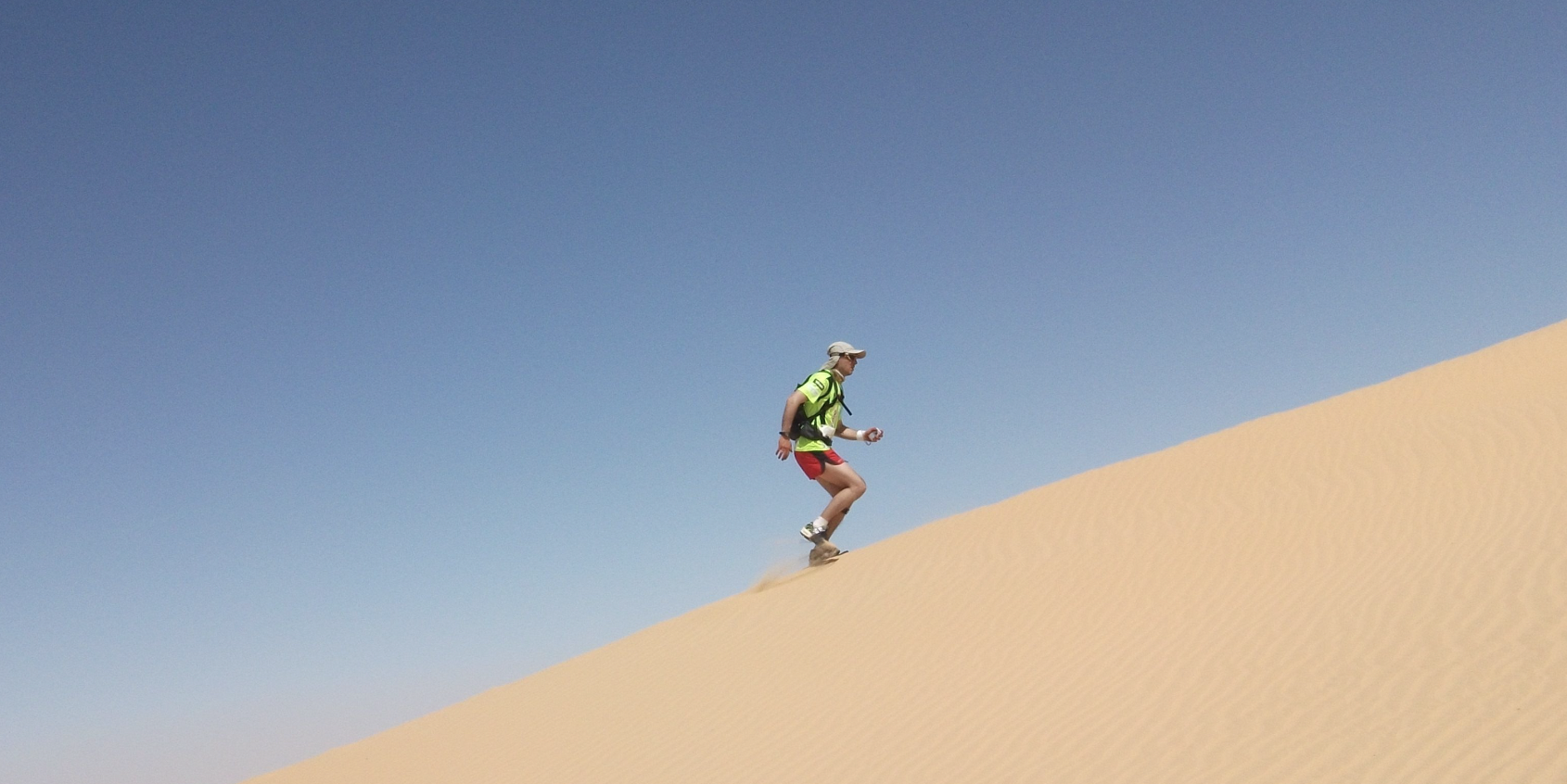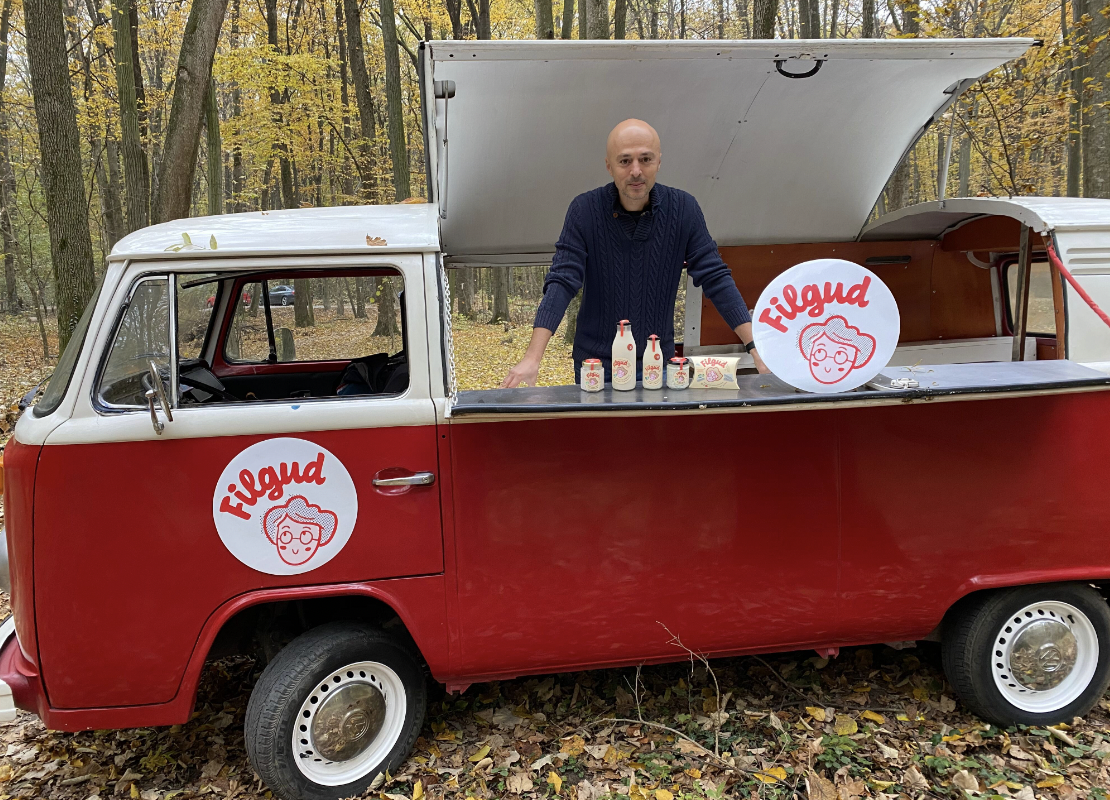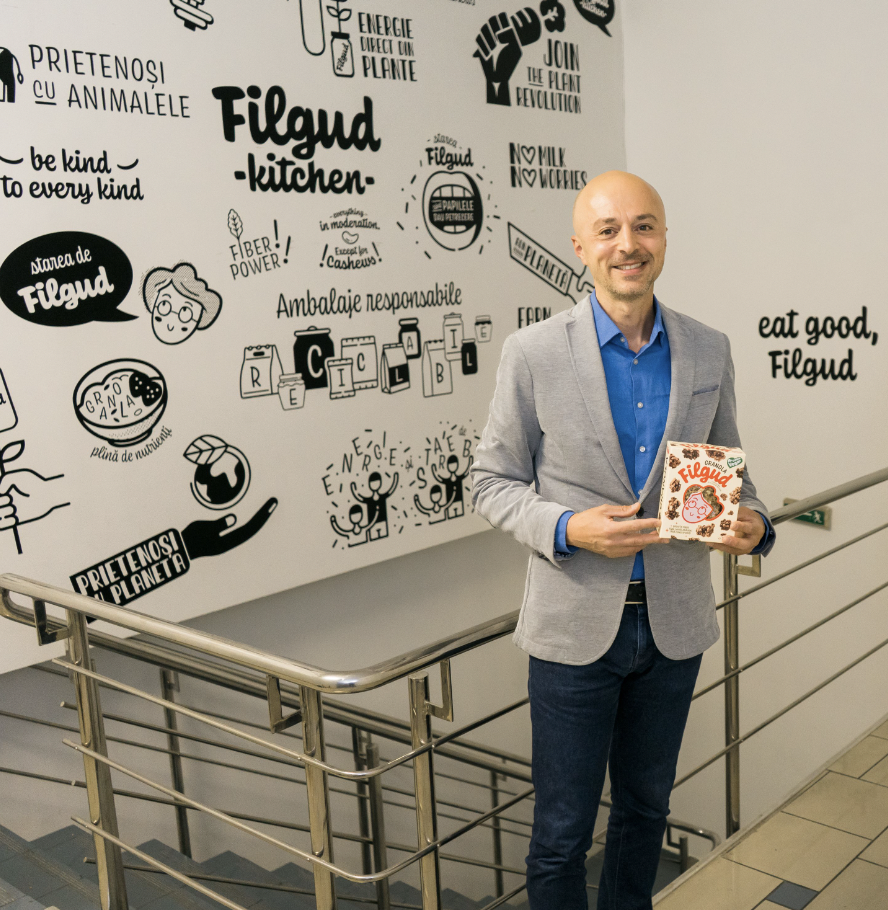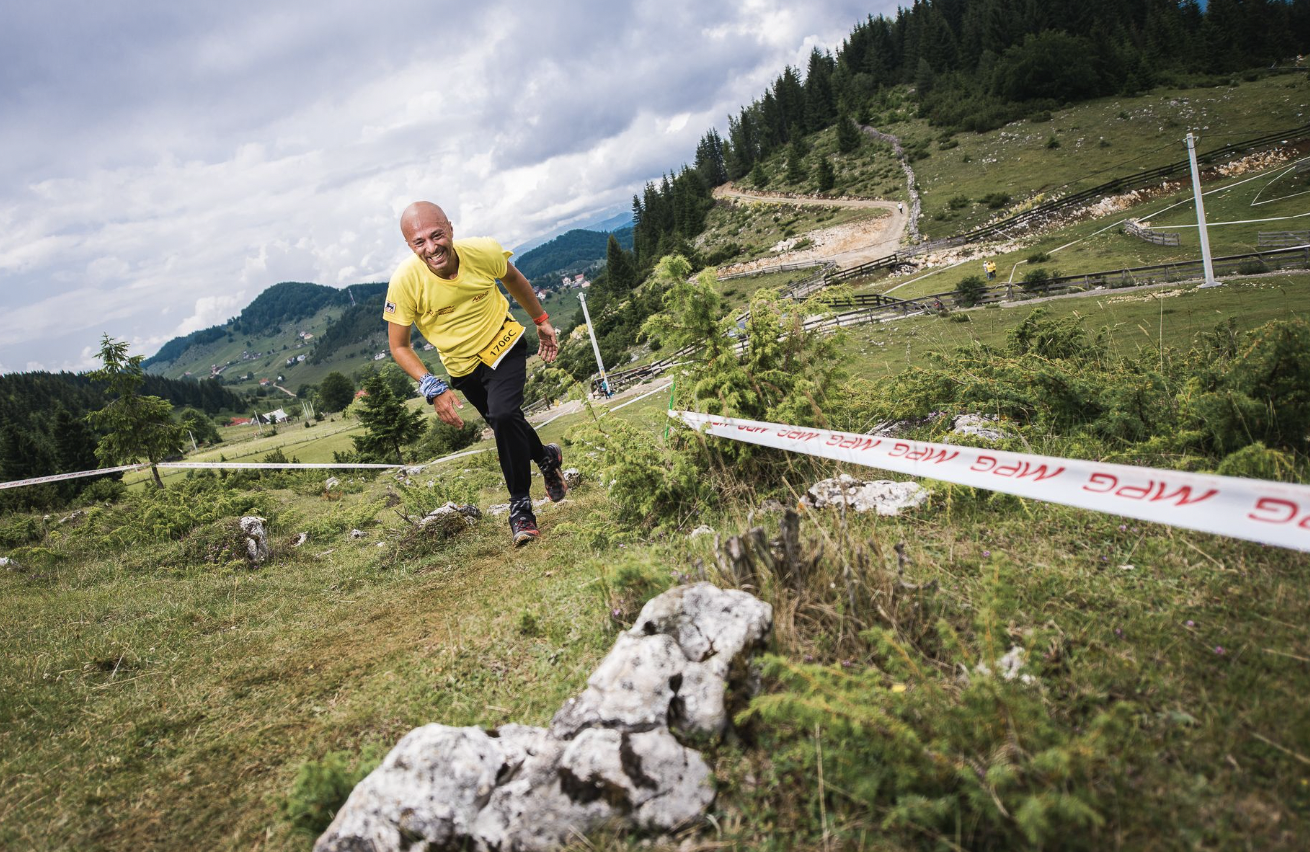
It seems that Andrii Roshu has done everything: worked in a corporation, ran marathons and ultramarathons on 7 continents, entered the Book of Records, learned to overcome fears and started a successful business with vegan products. The click happened when his first child was born, which opened his eyes and made him want to lead by example.
“All boats are safe in port, but they are not built for that. That’s why people climb Everest, go to the moon, go to Mars. We have something to explore what is happening around us, but also within us. Because the moment you overcome your fear, you automatically overcome some barriers,” Andriy told us.
We spoke to Andriy to get his story. Let’s see what it’s like to be many faces of one person, as he himself told us. Endurance athlete, social entrepreneur, musician, blogger, writer, father. Not necessarily in this order: “I have many roles. These are different sides of the same person. I think you shouldn’t limit your personality and give free rein to your passions,” Andrii admitted to us.

“Decline”, the way to the North Pole and the desire to be an example for your child
“The decision is made when your glass is full. For many of us, the glass is almost full, but the moment that makes us say “ready for this” is missing. When you become a parent, you automatically become a role model for your child, and then you think about what kind of role model you want to be. I quit smoking. I made some small adjustments in my life after the baby was born. I decided to run a marathon at the North Pole. I said this would be a goal that would help me change my life.”
The North Pole has attracted Andriy since childhood, from the time of reading Jules Verne. He was always curious, and the desire to get there was greater than the desire to actually run a marathon. His 16 years of corporate work have helped him set priorities and goals. Discipline is important and he had training on the job, it was easy for him to transfer it to the sports field.
Andrii Roshu, the first person to run marathons and ultramarathons on 7 continents
In March 2012, Romanian newspapers wrote about Andrei Rosha, who ran 7 marathons and 7 ultramarathons on 7 continents. He managed to complete 14 races in 582 days, compared to the 730 predicted by the Book of Records.
“It was the moment when I decided that I had to change the course of my life. It was clear that I wanted to change. The moment you transform, you don’t want to go back to the old version,” Andriy told us.
But it is not as simple as it seems. It requires dedication, time, ambition and the right motivation. To achieve the world record, Andriy had a plan and followed it. He trained 4 times a week, intensively, and after he was successful, he was able to say to himself, “How hard can everything else in life be?”
“The idea of an ultramarathon was not planned. A few months after I ran my first marathon at the North Pole, I went to Antarctica to do a marathon there. And the next day after the marathon in Antarctica, they also ran a 100 km ultramarathon. I was not prepared for this, I did not prepare for ultramarathons. I said that 100 km means 4 laps of 25 km. I ran 25km so how hard can it be? In addition, I learned that I will be a father for the second time,” Andriy said.
“Since I started running, I’ve circled the Earth about 2 times”
Andrei runs 5,000-7,000 km every year: “So, basically, I circled the Earth about 2 times.” He has run 10,000 km in official competitions and does not want to stop there.
“Usually big numbers scare us. At conferences, when I ask people “can you run 1,000km in the next year”, no one raises their hand except regular runners. 1000 km slows you down. But if you divide 1000 km by 365 days, that means 2.7 km per day. He’s not that scared.”
The last project of Andrii, an endurance athlete, is a project that started in 2018 and will last for 7 years. During these 7 years, he set himself the goal of running 40,000 km or 5 million steps. It’s on schedule, and he even hopes to finish a little sooner: “The idea is to break this very big goal into days or hours. Break it down into very small goals that seem achievable.”

“I want to run every day until I’m 100”
And if a 7-year project seems sufficient to you as the goal of a sports life, it did not seem so to Andrii: “At the beginning of the year, I rather jokingly than seriously said: “I am almost 50 years old, I am now 47. I will probably live to be 100 years old, so there are about 20,000 days left. So I set myself the goal of running every day for 20,000 days. I am currently on day 96 (#96/20000). Running until at least 100 is normal. After that, we’ll see.”
Feelgood is a successful business with vegan products
After deciding to go vegan, Andrey wanted to find as many places to eat that he liked, so he took a vegan cooking course run by Rodia, a restaurant he had a lunch subscription to. After the course, he presented his new skills to his family. He tested some of the recipes with family and friends, who were very excited, but at first did not believe that everything on the table was made only from plants. When people close to him told him that it would be great if he could find something similar in stores, Andriy says that the light bulb went off.

“I said, let’s get this business going. I partnered with a friend who owns a restaurant and in 2019 I launched Filgud. That was the beginning. Everyone who knew me said that this is the business that suits me best. And it was very comfortable for me because I knew what I was putting on my plate and my family food that I knew from the source. Starting from the raw materials to what hits the shelf. We consume these products every day, and then it is normal to want to produce them. For me, this is a functional food. It also provides nutrients, not just calories,” Andriy said.
Cashew spread with sun-dried tomatoes and arugula Feelgood – on the shelves of large supermarkets
When he and his business partner Fadia started their entrepreneurial journey, Andrii wanted to “get to the vans” in 3 years. “In the beginning, I remember that I made 16 cans. Then I printed a white sheet with the Feelgood logo on it. That was the goal. In order for our products to reach as many people as possible, we needed two things: funding so we could increase production capacity, and we needed to reach as many places as possible.”

Andriy and Fadia wanted to focus only on production, making those vegan products that are also on the tables of their families every day. So they outsourced everything that meant sales and distribution and focused only on getting Feelgood onto the supermarket shelves. “At first we started negotiations with Kaufland and Mega Image where we thought our audience was. They are very responsive, we started working with them just during the pandemic, when people became more open to such products.
“We want to bring business to the territory where companies registered on the stock exchange and international companies are located. I think we have very good products at competitive prices that we can go overseas with. In the first phase, we have to consolidate and cover the growing demand in Romania. There are a few simple steps to achieve this, but you need patience. It takes time to overcome all obstacles,” Andriy told us.
About business challenges and factoring, a “fantastic” solution for business growth
Since its inception, Filgood’s primary focus has been on production, not sales. And that’s because the demand was always higher than Andrii and Fadia could produce.
“It was a challenge to find production facilities, to get machines that meet the specifics of our business. All our spreads are made from fresh vegetables. Parsley, green onions, red onions and other vegetables are all fresh. We do not use dried vegetables and flavorings. That’s why not just any industrial equipment will do, you can’t get just any bottling and blending line. You need something individual. This process took about 12 months, and we managed to get the necessary equipment that can help us scale the business,” explained Andriy.
“Instant factoring appeared at our best moment. In Romania, and not only, startups are not financially supported by the state or banks. No startup has significant volumes and extraordinary profitability from the very beginning. In the beginning, you come with money from home or money from private investors, and you focus on volume. You have high start-up costs, you don’t have the sensational returns that make you attractive to banks. And then it is clear that we need a financial solution,” Andriy said.

credits: Vlad Rotaru
Factoring appeared as a lifeboat when long payment terms did not allow Andrii to produce as much as he would like with Filgood. Or at least as much as the market demanded.
“There is such a difference in terms of payment and collection. We collect from supermarkets and generally from our partners for about 30-45 days, but we have to make many payments in advance. Because there are very few suppliers who give you credit. And then you are at this level: you wait to get paid, then you supply and produce again. Supermarket shelves cannot be left empty. It is clear that the product must always be available. As a company, you produce and sell. But next week another order arrives, and then you have to go with the invoices from the supermarkets to the factoring agency. You immediately take your money and use this money to buy raw materials and products for the next week. The equation is very simple,” explained Andriy Roshu.
“For us, factoring is fantastic. It’s like paying and making money at the same time. In this way, we can grow indefinitely”, – Andrii Rosu
About the experience of Instant Factoring, Andrii says that it was definitely positive.
“I’m surprised more startup companies aren’t using this solution. Indeed, factoring also has a commission. But the alternative would be to come from home with your own money or the money of the shareholders. Money that is very expensive. In order to obtain funds for the purchase of equipment, we sold part of the company to private investors and with this money took the company to another level. You can also follow this business model by selling parts, but at some point you are left with nothing. So it shouldn’t be seen that way. Yes, you have to pay x% commission on these accounts. But what is the alternative? Give x% to the company. You may regret it in 3-5 years.”
“All boats are safe in port, but that’s not what they’re made for”
And as we talked about marathons and ultramarathons, the joy but also the challenge of being a parent, the obstacles in business and how we can overcome them, it seemed at least natural to reach the fear. Because there is an element of fear in everything. But to achieve success, you need to find the right mechanisms to overcome it.

“Like any person, I have many fears and phobias. In general, most fears are irrational. That is, it does not materialize in reality. And I realized that the comfort zone is a very good thing. This is the zone where everything is very safe, everything is under control, everything is predictable, you know what awaits you. But this is not the territory for development. All boats are safe in port, but they are not designed to do so. That’s why people climb Everest, go to the moon, go to Mars. We have something to explore what is happening around us, but also within us. Because the moment you overcome your fear, you automatically overcome some barriers,” Andriy told us.
Then you can become more, be more, have more. You will discover that you are much stronger than you think. You must create a context where being strong is your first and last choice. Set goals that you will prepare very well for and that will change you. This is the beauty of big goals. Both in business and in personal life.– Andrew the Red.
Article based on Instant Factoring
Source: Hot News
Ashley Bailey is a talented author and journalist known for her writing on trending topics. Currently working at 247 news reel, she brings readers fresh perspectives on current issues. With her well-researched and thought-provoking articles, she captures the zeitgeist and stays ahead of the latest trends. Ashley’s writing is a must-read for anyone interested in staying up-to-date with the latest developments.